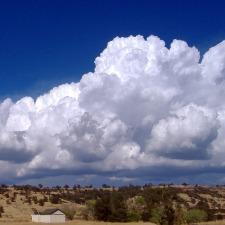BOB GARFIELD: It was a dark and stormy night. Last Friday, a thunderstorm in Virginia temporarily crippled part of Amazon’s cloud computing service. After a series of backups failed, such popular sites as Netflix, Pinterest and Instagram were, for several hours, knocked off the Internet. What were they doing on Amazon’s cloud in the first place? They lease server capacity there because it’s less expensive and more efficient than building out their own. But the outage is a reminder that our online access remains vulnerable, even in the pillowy remoteness of the cloud.
Nicholas Carr is the author of The Big Switch: Rewiring the World, from Edison to Google. Nick, welcome back to the show.
NICHOLAS CARR: Thanks a lot, Bob.
BOB GARFIELD: Let’s say I’m the average person, how much of what I do on the Internet and in my just ordinary computer applications takes place on the cloud?
NICHOLAS CARR: A whole lot of it. Over the last five or ten years, we’ve really gone from a model of personal computing, where everything pretty much was stored on our hard drive, to a model of personal computing where most things we do are done in the cloud, whether it’s Facebook or Twitter or your online banking or your email accounts.
In a similar way, big companies use services like Amazon Web Services to run their own applications for their business or to run their websites, or to do whatever they would traditionally do with their own servers and their own equipment. It’s a utility system, in essence, for computing.
BOB GARFIELD: Now, we know Amazon as a book retailer and, in fact, as an everything retailer. How is it that Amazon has become cloud to the world?
NICHOLAS CARR: Well, if you think about it, Amazon, in order to run its retailing operation, had to build an enormous computer system. And, as we know from retailing, demand goes up and down. You know, around Christmas you have to have tons of capacity for your shoppers and then in February it drops off. And so, what Amazon realized a number of years ago is it had all this extra capacity in its own system, and it’s invested a fairly huge amount, I think it’s fair to say, in building out data centers to rent out cloud computing capacity.
BOB GARFIELD: I just want to observe that in last weekend’s outage what we lost was Netflix streaming, which is tragic but no lives were lost, and Pinterest and Instagram. You know, the, the world still spun on its axis. What else resides in the cloud that really might have been catastrophic, had a similar series of events taken place?
NICHOLAS CARR: Pretty much everything. [LAUGHS] All commerce these days, lots of government services, lots of services in general take place online. And, therefore, they’re vulnerable to a big network failure.
Now, I have to say that’s independent from cloud computing because cloud computing is part of it but a lot of big companies, a lot of big financial institutions, the government run their own data centers, and those data centers are vulnerable too. So the risk doesn’t come from just cloud computing, it comes from the fact that more and more important services that we do, and, in fact, almost the entire economy, runs through the exchanges of data on networks. So there could be a catastrophic occurrence that would take that down and basically the economy would, would grind to a halt.
BOB GARFIELD: I can’t help but think about not last week’s outages but the great blackout of 1965, which shut down New York and New England and, and into Canada. As it’s constructed today, does the data storage utility pose that kind of risk?
NICHOLAS CARR: Probably not the same level of risk because, unlike the electric grid, which is run regionally, there’s no reason that a data center, for instance, in California couldn’t take over the load for one on the East Coast.
But what happened to Amazon is a warning because what should happen in these cases is that backup power supply, which all these data centers have, should kick in immediately. That didn’t happen here; for some reason, the backups didn’t work.
So here we see, in a kind of microcosm, how these unexpected chains of events can actually happen, set off by a massive thunderstorm. Anytime you get so many companies and so many people sharing the same - equipment, if that equipment fails then lots of people are affected.
BOB GARFIELD: Nick, as always, thank you very much.
NICHOLAS CARR: You’re very welcome.
BOB GARFIELD: Nicholas Carr is the author of The Big Switch: Rewiring the World, from Edison to Google.
